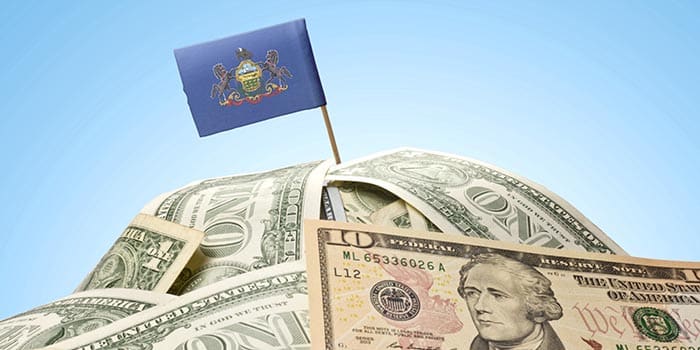
Pennsylvania Lottery Proposes Ending Profit Rule to Meet Demand for High-Priced Scratch-Offs
The Pennsylvania Lottery is advocating for a change in the state’s long-standing 20% profit mandate for regular lottery games. Lottery officials argue that eliminating this rule would allow them to introduce a wider variety of game options and generate more revenue for programs that assist elderly residents in the state.
Current Profit Mandate Challenged
Under the current law, the Pennsylvania Lottery is required to maintain a minimum profit margin of 20% on all traditional lottery games, such as number draws and scratch-off tickets. However, this rule does not apply to online lottery games. With the increasing popularity of higher-priced scratch-off tickets among consumers, lottery executives believe that the existing profit mandate hinders their ability to meet customer demands.
In the fiscal year 2023-24, the Pennsylvania Lottery recorded $4.8 billion in sales from traditional games, marking the 13th consecutive year of generating over $1 billion in profits. Despite this success, officials believe that implementing better payout rates on premium scratch-off games could further boost revenue.
Appeal of High-Priced Scratch-Offs
Scratch-off tickets priced at $30 and $50 have gained significant traction among players due to the allure of multimillion-dollar jackpots. However, these games require a higher payout percentage, making it challenging for the lottery to meet the 20% profit threshold. By abolishing this rule, officials anticipate being able to offer more high-cost games, attracting a larger player base and increasing overall revenue.
Governor Josh Shapiro has expressed support for eliminating the profit mandate as part of his broader budget plan. In his 2025-26 budget proposal, Shapiro emphasized the potential for the lottery to enhance its earnings through a more flexible pricing structure.
Debate Over Lottery Reforms
As discussions around the proposed changes to the lottery intensify, critics have raised concerns about potential negative impacts on low-income communities. Andrew Shaffer, a member of the National Board of the Stop Predatory Gambling Foundation, cautioned against making pricey scratch-off games more accessible, as it could disproportionately affect economically disadvantaged areas.
Shaffer highlighted that lottery sales tend to be highest in communities with limited financial resources, implying that these individuals may already be financially vulnerable. He described the lottery as a regressive form of taxation that places a heavier burden on the less affluent, with a significant portion of its revenue derived from individuals who can ill afford to engage in gambling activities. Additionally, he noted that older beneficiaries of lottery-funded programs may be apprehensive about expanding gambling opportunities, fearing the potential repercussions on younger generations.
Looking Ahead
While the Pennsylvania Lottery continues to advocate for policy changes, the ongoing debate underscores the need for lawmakers to strike a balance between revenue generation and social concerns surrounding gambling. The outcome of these deliberations remains uncertain, but stakeholders anticipate intensified discussions in the coming months as the state grapples with the future direction of its lottery system.
การพิจารณาเสนอแนะเพื่อเพิ่มรายได้
การเสนอเพื่อยุติกฎกำไรหลัก 20% ในการเล่นสลากเพนซิลเวเนีย เป็นส่วนหนึ่งของการแก้ปัญหาในการตอบสนองความต้องการของผู้เล่นที่ต้องการซื้อตั๋วสลากที่มีราคาสูงขึ้น ซึ่งมูลนิธิการกีฬาเพนซิลเวเนียมุ่งตรงไปที่การช่วยเหลือผู้สูงอายุในรัฐนั้น
กฎกำไรปัจจุบันที่ท้าทาน
ตามกฎหมายปัจจุบัน มูลนิธิการกีฬาเพนซิลเวเนียต้องรักษาขอบเขตกำไรขั้นต่ำที่ 20% ในเกมสลากทั่วไป เช่น การออกตรวจหมายเลขและตั๋วสลาก อย่างไรก็ตาม กฎนี้ไม่ใช้กับเกมสลากออนไลน์ ด้วยความนิยมที่เพิ่มขึ้นของตั๋วสลากที่มีราคาสูงขึ้นในตลาด ผู้บริหารการเล่นสลากเชื่อว่ากฎกำไรที่มีอยู่ขัดขวางความสามารถของพวกเขาในการตอบสนองความต้องการของลูกค้า
ในปี งบประมาณ 2023-24 มูลนิธิการกีฬาเพนซิลเวเนียบันทึกยอดขายจากเกมทั่วไป 4.8 พันล้านดอลลาร์ แสดงถึงครั้งที่ 13 ของการสร้างกำไรเกิน 1 พันล้านดอลลาร์อย่างต่อเนื่อง แม้ว่าความสำเร็จนี้ ผู้ดูแลเชื่อว่าการใช้อัตราการจ่ายที่ดีขึ้นในเกมสลากราคาพรีเมี่ยมสามารถเพิ่มรายได้ได้อีก
ความสนใจในการซื้อตั๋วสลากที่ราคาแพง
ตั๋วสลากราคา 30 และ 50 ดอลลาร์ได้รับความนิยมในหมู่ผู้เล่นอย่างมากเนื่องจากความลุ้นลุลาของเงินรางวัลที่มียอดเป็นล้าน อย่างไรก็ตาม การเล่นเกมเหล่านี้ต้องการเปอร์เซ็นต์การจ่ายที่สูงขึ้น ทำให้มูลนิธิการกีฬาไม่สามารถตอบสนองได้ตามเกณฑ์กำไร 20% โดยการยุติกฎนี้ ผู้ดูแลคาดว่าจะสามารถเสนอเกมที่มีต้นทุนสูงขึ้น ดึงดูดกลุ่มผู้เล่นให้มากขึ้นและเพิ่มรายได้โดยรวม
ผู้ว่าการโจชัว ซาปิโร แสดงความสนับสนุนในการยุติกฎกำไรเป็นส่วนหนึ่งของแผนงบประมาณที่กว้างขวางของเขา ในคำของงบประมาณ 2025-26 ซาปิโรเน้นถึงศักยภาพของการเล่นสลากในการเพิ่มรายได้ผ่านโครงสร้างราคาที่ยืดหยุ่นขึ้น
การโต้แย้งเกี่ยวกับการปรับปรุงในการเล่นสลาก
เมื่อการสนทนาเกี่ยวกับการเปลี่ยนแปลงที่เสนอขึ้นสูงขึ้น ผู้วิจารณ์กล่าวถึงข้อกังวลเกี่ยวกับผลกระทบที่เป็นไปได้ต่อชุมชนที่มีรายได้น้อย แอนดรูว์ ชาเฟอร์ สมาชิกของคณะกรรมการหยุดการพนันที่ก่อการร้าย ตัวเข้าขวัญให้เกมสลากที่ราคาแพงขึ้นเข้าถึงได้ง่ายขึ้นเนื่องจากระดับเรทที่ต่ำกว่า ทำให้มีผลกระทบอย่างไม่สมเหตุสมผลต่อพื้นที่ที่ด้อยโอกาสทางเศรษฐกิจ
ชาเฟอร์เน้นว่าการขายสลากมักจะสูงสุดในชุมชนที่มีทรัพยากรทางการเงินจำกัด แม้ว่าบุคคลเหล่านี้อาจจะอยู่ในภาวะที่มีเงินผิด สังเกตขนาดของรายได้ที่มาจากบุคคลที่ไม่สามารถมีส่วนร่วมในกิจกรรมการพนัน ในตัวอย่างนี้เขายังได้บอกว่าผู้รับประโยชน์ที่มากว่าจากโปรแกรมที่ได้รับทุนจากการขายสลากอาจจะกลัวการขยายโอกาสในการเล่นพนัน กลัวผลกระทบที่เป็นไปได้ต่อรุ่นที่อายุน้อยกว่า
มองเข้าไปข้างหน้า
ขณะที่มูลนิธิการกีฬาเพนซิลเวเนียยังคงสนับสนุนการเปลี่ยนแปลงนํามาขณะที่การสนทนาต่อเกี่ยวกับการเล่นสลากที่เสนอขึ้น นำมาสูงขึ้น การโต้แย้งอย่างต่อเนื่องเน้นระบุความจำเป็นที่ต้องมีสมดุลการเล่นสลากระหว่างการสร้างรายได้และผลกระทบทางสังคมเกี่ยวกับการเล่นพนัน ผลลัพธ์ของการชี้โน้มนี้ยังไม่ชัดเจน แต่ผู้มีส่วนได้ส่วนเสียคาดหวังการสนทนาที่เข้มงวดในเดือนต่อๆมาเนื่องจากรัฐกำลังหาทิศทางการเล่นสลากไปในอนาคต















